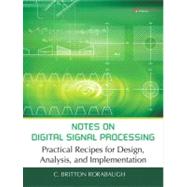
What is included with this book?
| Navigating the DSP Landscape | |
| Sampling Baseband Signals | |
| Ideal Sampling | |
| Natural Sampling | |
| Instantaneous Sampling | |
| Practical Sampling | |
| Reconstructing Physical Signals | |
| Sampling Bandpass Signals | |
| Mastering DFT Basics | |
| Analyzing DFT Leakage | |
| Exploring DFT Resolution | |
| Characterizing Window Functions | |
| Estimating Spectra with the Unmodified Periodogram | |
| Estimating Spectra with the Modified Periodogram | |
| Estimating Spectra with Bartlettrsquo;s Periodogram | |
| Estimating Spectra with the Welch Periodogram | |
| Designing FIR Filters: Background & Options | |
| Designing FIR Filters: Linear Phase Approaches | |
| Designing FIR Filters: Window Method | |
| Designing FIR Filters: Kaiser Window Method | |
| Designing FIR Filters: Parks-McClellan Algorithm | |
| ThezTransform: Definitions & Properties | |
| Computing the InversezTransform | |
| Designing IIR Filters: Background & Options | |
| Designing IIR Filters: Characteristics of Analog Prototype Filters | |
| Designing IIR Filters: Surveying Analog Prototype Filter Families | |
| Designing IIR Filters: Impulse Invariance | |
| Designing IIR Filters: Bilinear Transformation | |
| Multirate Signal Processing: Decimation Basics | |
| Multirate Signal Processing: Interpolation Basics | |
| Frequency-Shifting Techniques: Integer-Band Sampling | |
| Understanding Complex & Analytic Signals | |
| Generating Analytic Signals with FIR Hilbert Transformers | |
| Generating Analytic Signals with Frequency-Shifted FIR Lowpass Filters | |
| Generating Analytic Signals with IIR Phase-Splitting Networks | |
| Generating Analytic Signals with Complex Equiripple FIR Filters | |
| Generating I & Q Channels Digitally: Raderrsquo;s Approach | |
| Parametric Modeling of Discrete-Time Signals | |
| Table of Contents provided by Publisher. All Rights Reserved. |
The New copy of this book will include any supplemental materials advertised. Please check the title of the book to determine if it should include any access cards, study guides, lab manuals, CDs, etc.
The Used, Rental and eBook copies of this book are not guaranteed to include any supplemental materials. Typically, only the book itself is included. This is true even if the title states it includes any access cards, study guides, lab manuals, CDs, etc.